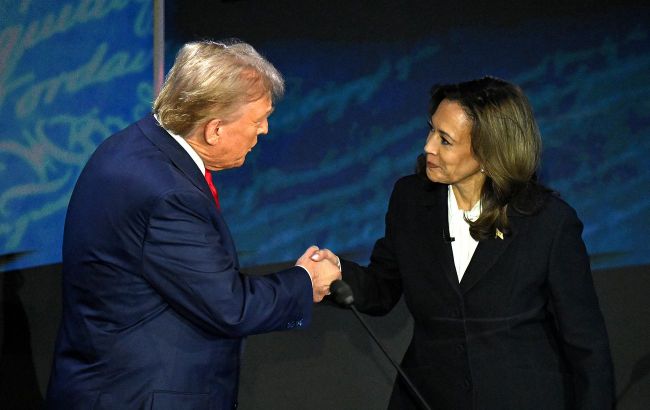Harris defeats Trump by points: Main results of US presidential debate
 Donald Trump and Kamala Harris at the debate (all photos: Getty Images)
Donald Trump and Kamala Harris at the debate (all photos: Getty Images)
Read about the first debate between US presidential candidates Donald Trump and Kamala Harris, what they talked about, and why the Democrat was able to beat the Republican in RBC-Ukraine's article.
The June debate between Joe Biden and Donald Trump was heralded by American observers as historic and life-changing. In many ways, it was. In a few weeks, the US president's disastrous performance led to the replacement of the Democratic presidential candidate - his vice president Kamala Harris was nominated instead of Biden.
This completely changed the course of the campaign, as Trump's almost guaranteed victory began to slip from his grasp. Harris very soon began to outperform her rival both in the national ratings and at the level of the swing states, where the outcome of the campaign would be determined.
There were several reasons for this. First, the effect of novelty - it turned out that Democratic voters were so tired of Biden's lethargy and constant reservations that his replacement with a young and energetic candidate (Harris is 22 years younger than Biden) brought an electoral effect in itself. Second, Harris immediately ran the campaign very competently, listening to her technologists. Thirdly, her campaign itself took place in a rather greenhouse environment - Harris made public appearances with pre-prepared speeches and to a friendly audience, giving only one major interview to a serious media outlet.
So before the debate with Trump, there was some concern in the Democratic camp about whether Harris would be able to stand up to the seasoned orator Trump, who has much more experience in debating at the highest level.
.jpg) Photo: Donald Trump (Getty Images)
Photo: Donald Trump (Getty Images)
'Harris set the hook, and Trump took the bait' is the metaphor used by almost all American journalists and commentators on the debate. One of Harris's main tasks was to make her opponent angry, and she succeeded.
Before the debate, it was assumed that Trump would resort to personal attacks on his opponent more often, but in practice, it turned out the opposite: Harris spent 46% of her time criticizing Trump, while he devoted only 29% of his timing to criticizing the Democrat.
One of the most striking examples was when Harris jabbed Trump with the fact that "people started leaving his rallies early out of exhaustion and boredom". This is a sore subject for Trump - he always spends a disproportionate amount of time talking about how big his rallies are, how much bigger and brighter they are than his competitors, etc. And Trump lost his temper, continuing to argue that he has "biggest rallies in the history of politics" even as the discussion moved on to other topics.
From the first minutes of the debate, Harris took the initiative, which can be explained by her quality preparation. Her staff devoted a lot of time to the debate, making home preparations, rehearsing answers, and conducting simulations of the debate itself behind closed doors. Trump, on the other hand, according to interlocutors in his team, treated the event more casually, clearly confident in his abilities and experience. But while this approach worked with Biden - in June, the US president lost the debate rather than Trump winning it - it did not with Harris. As a result, Trump was on the defensive for many debates. It was unusual for him, and it pissed him off, which made him make even more mistakes.
It is hard to say that Harris's speech was full of deep programmatic meanings. But she did not have such a task.
She had to, first of all, prove herself to America. According to pre-debate polls, a significant number of Americans who were considering supporting her would first like to get to know her better. Indeed, Harris essentially entered the big political scene only a month and a half ago after Biden dropped out of the race. Before that, she was in the president's thick political shadow, and her work as vice president was not memorable to Americans. Her performance at the debate helped to correct this problem.
Secondly, it was important for Harris to present herself as a candidate of the future who thinks about people and not about herself. This was a red thread running through all of her remarks, culminating in her last speech, where she directly contrasted herself with Trump: she is focused on the future, he is focused on the past, she is uniting Americans, he is dividing, she is thinking about the people, he is thinking about himself.
And even if Harris did not give many specifics about her concrete plans for the presidency, she still looked more convincing against Trump. At the end of the debate, the Republican missed a powerful blow, not from Harris, but from the moderators. They asked him if he had a specific plan for health care reform, to which Trump said he only had a concept of a plan because he was not president right now.
But any debate is usually remembered not so much for programmatic discussions as for individual bright episodes that immediately become memes. At the June debate, such a meme was Biden's confused and anxious expression as he listened to his opponent's remarks. Now, Harris's lively reactions have spread across social media: a slight half-smile, ironic looks, laughter.
.jpg) Photo: Kamala Harris (Getty Images)
Photo: Kamala Harris (Getty Images)
The second thing that will be remembered by the mass audience is the topic of migrants eating cats and dogs. It had become a popular topic of discussion even before the debate, thanks to the Republicans, who allegedly claimed that in Springfield, Ohio, migrants from Haiti were stealing residents' pets to eat them. Trump himself brought up the topic and devoted a disproportionate amount of time to it, even though there is no real evidence of such barbarism on the part of Haitian migrants.
Thus, Trump missed an opportunity to capitalize on what is essentially his most trump card (and the most uncomfortable for Harris), and a very important issue for American voters - illegal migration. Instead, the entire American Twitterverse is now discussing cats and dogs. And Harris provoked it by turning the conversation to the topic of attending rallies instead of discussing migration as such.
The most favorable topic for her, the abortion ban, was also successfully turned in her favor. While she avoided being very specific on many issues, she was quite clear about her position on the abortion ban. While Trump repeated his usual talking points that in some US states, it is allowed to kill even newborns and avoided direct answers. The Republican candidate is in a difficult position: on the one hand, most Americans are opposed to abortion bans to varying degrees, and on the other hand, there are loud groups of conservatives in the Trumpist camp who support the most stringent prohibitionist policies. Trump has been trying to maneuver between these poles throughout the campaign, but not very successfully.
International politics found a place only at the end of the first hour of the debate (it lasted a little longer than planned, an hour and forty-five minutes). As for Ukraine, there was no more clarity on what kind of policy the US will pursue under the next president.
Harris repeated in general terms the hackneyed thesis that Ukraine needs to be supported and that thanks to American support, it can defend itself against Russian aggression.
Trump, on the other hand, twice avoided the direct question of whether he wants Ukraine to win the war and whether it is in the interests of the United States, in his understanding. Instead, he once again blamed Biden for everything that was happening and promised to stop the war instantly by calling Volodymyr Zelenskyy and Vladimir Putin. The Trump plan for Ukraine remained in complete obscurity after the debate.
.jpg) Photo: Donald Trump (Getty Images)
Photo: Donald Trump (Getty Images)
In the end, 63% of those polled by CNN immediately after the debate favored Harris, while 37% called Trump the winner. But here we should wait for more serious sociology in a few days, which will show how much the debate affected the candidates' ratings.
Immediately after the debate, Trump suffered a new serious blow - American mega-star Taylor Swift publicly endorsed Harris. And the effect of this may be even greater than the debate.

